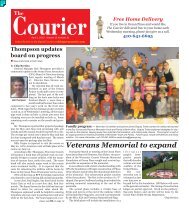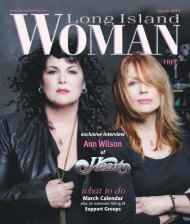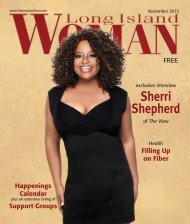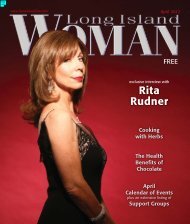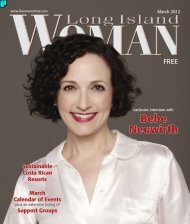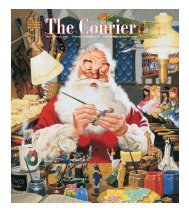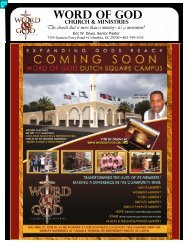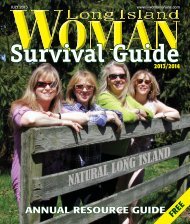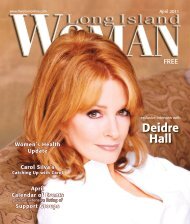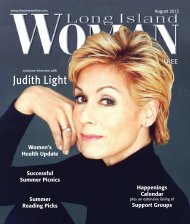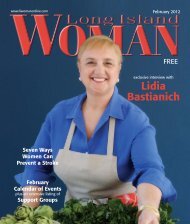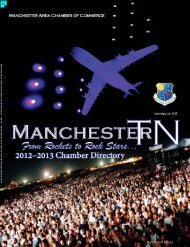Norah O'Donnell
Norah O'Donnell
Norah O'Donnell
Create successful ePaper yourself
Turn your PDF publications into a flip-book with our unique Google optimized e-Paper software.
THE LONG ISLAND WOMAN INTERVIEW<br />
by Arie Nadboy<br />
<strong>Norah</strong> O’Donnell<br />
<strong>Norah</strong> O’Donnell has all the ingredients for a successful television<br />
journalist; she’s smart, attractive, has an engaging personality and<br />
gravitates toward hard work. As a result, she’s quickly covered all the<br />
bases in television journalism. And, she’s done it without much publicity<br />
or fanfare.<br />
You can see <strong>Norah</strong> O’Donnell every weekday morning along with her cohosts,<br />
Gayle King and Charlie Rose on CBS This Morning. On weekends,<br />
you can occasionally see her as the substitute host of Face the Nation.<br />
Recently, she’s achieved her career dream and also contributes to 60<br />
Minutes. She’s exactly where she wants to be and loves every minute of<br />
it.<br />
Ms. O’Donnell resides in New York City with her restaurateur husband,<br />
Geoff Tracy, and their three children.<br />
Long Island Woman met with <strong>Norah</strong> O’Donnell at her CBS office to talk<br />
about her rise to the heights of tv journalism.<br />
Let’ start at the beginning. Where you were born and raised<br />
I’m an army brat. My parents are from New York. My mother’s from<br />
Jamaica, Queens and my father is from Staten<br />
Island. They met when my father was in med<br />
school and he was drafted to the army. He was<br />
doing his residency in St. Vincent’s Hospital<br />
down in the village, so he didn’t go to Vietnam<br />
but he stayed in the army for 30 years. They<br />
moved to Washington DC where I was born,<br />
then to Germany and then we moved back to<br />
San Antonio, Texas where I spent most of my<br />
childhood. When I was ten we moved to Seoul,<br />
South Korea. Then we moved back to San<br />
Antonio where I finished high school. I went to<br />
Georgetown University, met my husband there<br />
and lived in Washington for the next 20 years.<br />
So that’s kind of the quick and dirty.<br />
How did you adjust to all of those moves<br />
Very well. You know, its interesting. When<br />
I was first hired by NBC, one of our vice<br />
presidents of talent mentioned to me that a lot<br />
of our journalists are actually from military backgrounds, partly because<br />
they are very adaptable. They don’t mind moving around because that’s<br />
sort of what they’re used to as children.<br />
So you were well prepared for this career.<br />
Yes, and I was very young when we were in Germany. I was only two<br />
years old. But Seoul, South Korea was a wonderful tour of duty in the<br />
eighties. It was also my first foray into television. All middle school<br />
and high school students are required to take English. My mother met<br />
someone and they needed a young girl’s voice to make the tapes you<br />
learn English with. I made some of those tapes. I made a little extra<br />
money and I would go to the table at the market and buy Nike shoes or<br />
Jack Wagner tapes or polo shirts. You know, things you do when you are<br />
ten or eleven years old.<br />
So I’ve had a job since I was ten years old. Even when we moved back to<br />
Interviewing Ahmadinejad<br />
“Then I sat down and I<br />
was told I can’t cross my<br />
legs. And of course, he<br />
never addressed me by<br />
my name.”<br />
San Antonio, I baby-sat and worked in a Chinese restaurant as a hostess.<br />
In Georgetown you earned a BA in philosophy and a masters degree<br />
in liberal arts. At what point did you realize that you wanted to go into<br />
journalism<br />
I had a father in medicine, so maybe I wanted to do medicine. Or maybe<br />
I wanted to be a lawyer, so I worked at a law firm my freshman year while<br />
I was at Georgetown. Then I loved philosophy. Then my senior year I got<br />
an internship with ABC news and that’s where I really caught the bug.<br />
I tell people in college now to explore those interests through internships<br />
and decide if you like those people, that type of job, the career, what they<br />
do….. That’s how you figure out what you want to do. I really enjoyed<br />
journalism.<br />
You’ve shown tremendous versatility and flexibility in your field; Chief<br />
White House correspondent, regular on the Chris Matthews show, election<br />
coverage, news anchor, now you’re co-anchoring CBS This Morning. You<br />
rise to each level without a lot of fanfare or controversy. That seems to<br />
be very uncommon these days.<br />
I think that mine was a pretty traditional path. I was a print journalist<br />
first, so I was schooled in reporting and writing<br />
my own stories with a notebook. I took my<br />
own photographs for some of my stories. Then<br />
it was kind of the beginning of cable news<br />
and I made some appearances on cable news<br />
shows. Then I was offered a job at some of the<br />
networks. Then I became a correspondent at<br />
NBC when I was 25 years old, which was young.<br />
They taught me how to do the television side<br />
of reporting. I certainly had some experience<br />
from the print side, but writing for tv is different<br />
than for a paper or a magazine.<br />
I think the traditional path is; you cover the<br />
White House, you cover Congress, you cover<br />
the Pentagon. I got some pretty incredible<br />
posts at NBC so I covered just about everything<br />
in Washington. The thing is, with NBC having<br />
MSNBC, I also got to do a lot of anchoring. It<br />
really was in many ways a great opportunity to<br />
hone my skills as a reporter, but also to develop some skills as an anchor<br />
as well, especially during breaking news situations. So it was really a nice<br />
combination.<br />
I traveled all over the world with President Clinton, President Bush and<br />
President Obama. I’ve been to every battleground state multiple times so<br />
I’ve done a lot of traveling. I think there is something incredibly important<br />
about being on the ground, to have to show up at a satellite truck two<br />
hours beforehand, take a bus there, write a minute and a half script, deal<br />
with the elements and have to feed it in through a remote truck.<br />
Television is incredibly hard work. I think sometimes people don’t know<br />
what goes on behind the scenes. It takes all day sometimes to put a<br />
minute and a half script together.<br />
Do you feel that there is still a glass ceiling for women in your industry<br />
I think a lot has changed. I think there is incredible opportunity for



